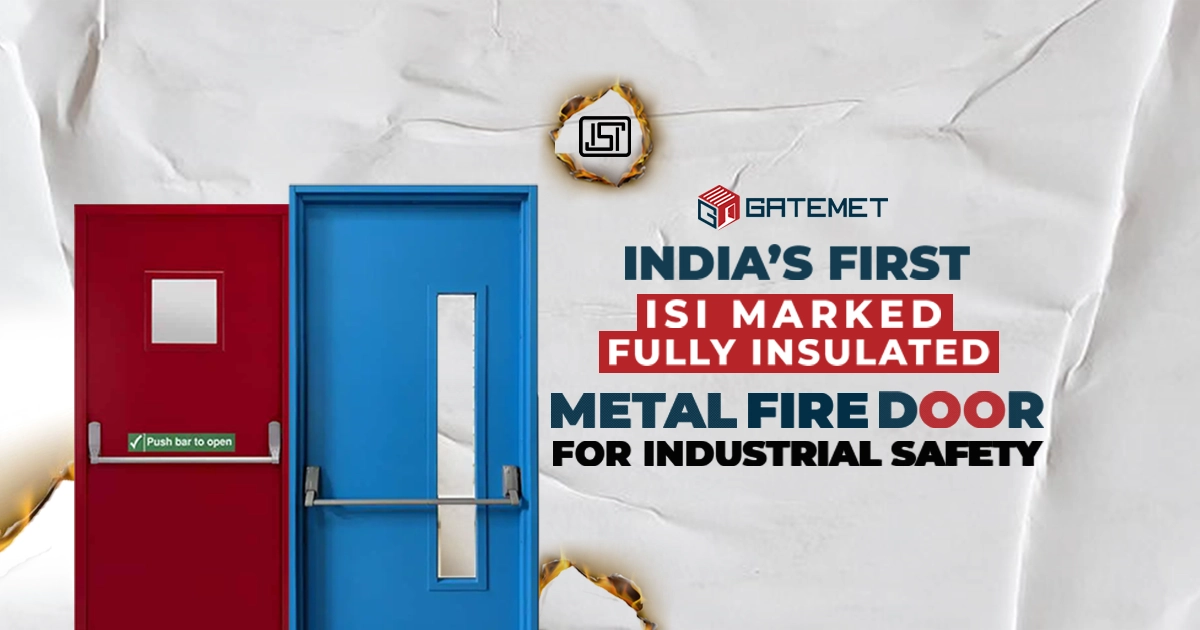ISI Certification’s Significance in the Fire Door Sector Cutting shortcuts is never an option regarding fire safety. For this reason, ISI certification is quite important in the fire door business. The product has passed rigorous testing and conforms with Bureau of Indian Standards (BIS) requirements if it bears the ISI mark. It is a quality seal that ensures performance, dependability, and safety.
This certification is particularly significant for fire doors since it attests to the door’s ability to tolerate high temperatures, control fire, and stop the spread of smoke. To guarantee the best possible safety of people and property, any type of building—commercial, medical, residential, or industrial—must have a fire door with the ISI marking.
Selecting a completely insulated metal fire door with the ISI logo indicates that you are choosing a product that satisfies national safety regulations and has undergone quality, durability, and fire resistance testing. These doors can limit the fire and buy crucial time for a safe evacuation in emergency scenarios.
Declaration of the Accomplishment: Certification of ISI-Marked Fully Insulated Metal Doors with #FD 120 ID
We are pleased to report that Tufwud’s fully insulated metal door fire rated with FD 120 ID has received ISI certification! This certification is a noteworthy accomplishment that demonstrates our dedication to safety, innovation, and quality.
To demonstrate its resilience to extreme temperatures and fire spread, our metal door has undergone extensive testing. This makes it the best option for a variety of applications, including residential and commercial buildings, hotels, and hospitals.
Although obtaining this accreditation was not simple, it shows how committed we are to providing premium fire doors that adhere to the strictest safety regulations. We take pride in providing our customers with unparalleled safety and quality, as we are among the few manufacturers in India to obtain this accreditation.
Select Tufwud, the insulated option!
The Path to ISI Certification for Tufwud
It was difficult yet wonderful to get our fully insulated metal fire door certified by ISI. The door was designed and tested to satisfy all safety requirements after a thorough investigation to comprehend BIS standards.
Achieving complete insulation while preserving structural integrity and fire resistance was the most difficult task. To make sure the door could tolerate high temperatures without warping or losing strength, our team of engineers and specialists carried out extensive testing.
Our door received the ISI label, demonstrating its exceptional quality and safety requirements, after passing several tests, such as those measuring fire endurance, insulating performance, and structural stability.
A Fully Insulated Metal Fire Door: What Is It?
A metal fire door that is completely insulated is made specifically to keep heat and fire contained and stop it from spreading to other areas of the structure. It offers thermal insulation, which keeps the temperature on the protected side considerably lower during a fire than traditional fire doors.
In settings where temperature control and fire safety are equally crucial, such as hospitals, hotels, data centers, business complexes, and residential buildings, these doors are indispensable. Additionally, the insulation provides acoustic benefits, preserving safe and peaceful spaces.

Important characteristics of the ISI-Marked Fully Insulated Metal Doors with FD 120 ID
✔ ISI Certified: Fulfills BIS fire safety requirements.
High Fire Resistance: Able to withstand high temperatures without undergoing deformation.
Complete insulation keeps people safe by preventing heat transfer.
✔ Sturdiness and Power: Constructed from superior metal.
✔ Acoustic Insulation: Perfect for hospitals and hotels, it lowers noise.
✔ Adaptable Designs: Ideal for a range of uses and aesthetics.
The Reasons Behind the Absence of ISI-Marked Fully Insulated Metal Doors from Other Metal Door Manufacturers
Fully insulated metal fire doors are not produced by all manufacturers, despite their exceptional performance and safety. The main causes are:
High Production Costs: Production is costly due to the use of sophisticated processes and specialized insulating materials.
Costs associated with testing and certification: ISI certification necessitates thorough testing, which is expensive and time-consuming.
Technical Complexity: Engineering know-how is required to achieve both fire resistance and insulation.
Market Demand and Cost Factors: Many manufacturers choose to use simpler fire doors because they are more expensive.
We at Tufwud never skimp on safety. We provide ISI-marked metal doors that safeguard people and property because we are dedicated to quality and innovation, which motivates us to invest in the best materials and methods.
Why Choose Tufwud?
Tufwud is a respected authority in fire safety. Our fully insulated metal fire doors with FD 120 ID provide unwavering performance, safety, and quality. We have decades of experience creating doors that guarantee peace of mind and save lives.
We are committed to giving our customers the best fire safety solutions possible so they are ready for any fire situation. Call Us: +91 84200 50751 or Email Us: sales@tufwud.com
Get Premium Quality Metal Doors at Best Price
Let our professionals help you in choosing the right products.
FAQ
1. Why can’t all metal doors be fully insulated?
Because obtaining both fire resistance and insulation calls for sophisticated engineering and specialized materials, which raise production complexity and cost, not all metal doors can be completely insulated.
2. Why do we need insulated fire doors?
Insulated fire doors not only block fire and smoke but also reduce heat transfer, protecting occupants and maintaining safer exit routes during emergencies.
3. Are fully insulated metal fire doors suitable for residential use?
Yes, they are perfect for residential buildings as they provide both fire safety and noise reduction.
4. How long do ISI-marked fire doors resist fire?
Tufwud’s ISI-marked fire doors are designed to withstand high temperatures for extended periods, allowing safe evacuation.


